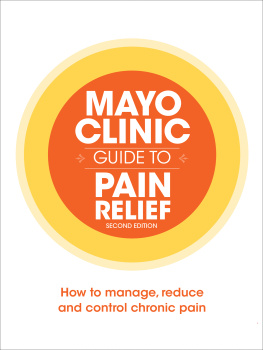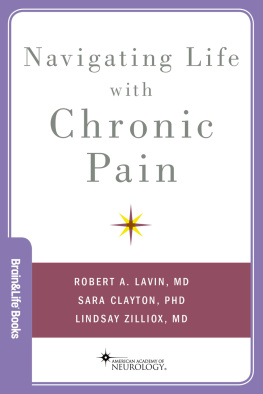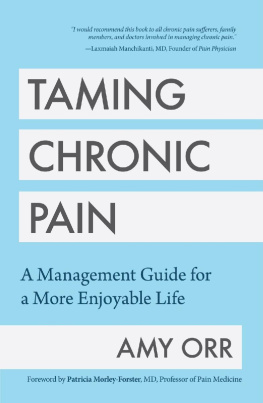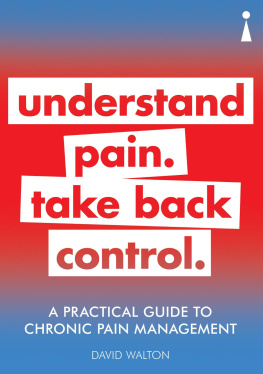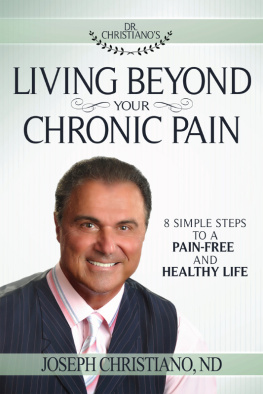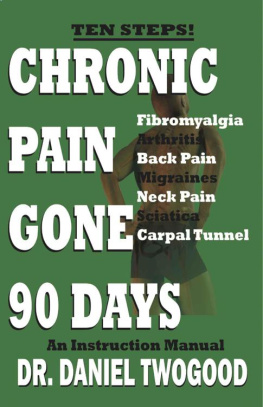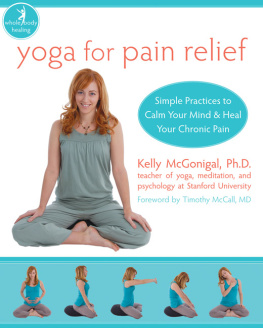Confronting Chronic Pain
A JOHNS HOPKINS PRESS HEALTH BOOK
CONFRONTING CHRONIC PAIN
A Pain Doctors Guide to Relief
STEVEN H. RICHEIMER, M.D.
with
KATHY STELIGO

Note to the Reader. This book is not meant to substitute for medical care of people with pain, and treatment should not be based solely on its contents. Instead, treatment must be developed in a dialogue between the individual and his or her physician. Our book has been written to help with that dialogue.
Drug dosage: The author and publisher have made reasonable efforts to determine that the selection of drugs discussed in this text conform to the practices of the general medical community. The medications described do not necessarily have specific approval by the U.S. Food and Drug Administration for use in the diseases for which they are recommended. In view of ongoing research, changes in governmental regulations, and the constant flow of information relating to drug therapy and drug reactions, the reader is urged to check the package insert of each drug for any change in indications and dosage and for warnings and precautions. This is particularly important when the recommended agent is a new and/or infrequently used drug.
2014 Johns Hopkins University Press
All rights reserved. Published 2014
Printed in the United States of America on acid-free paper
9 8 7 6 5 4 3 2 1
Johns Hopkins University Press
2715 North Charles Street
Baltimore, Maryland 21218-4363
www.press.jhu.edu
Library of Congress Cataloging-in-Publication Data
Richeimer, Steven, author.
Confronting Chronic Pain : a pain doctors guide to relief / Steven H. Richeimer, M.D.; with Kathy Steligo.
pages cm. (A Johns Hopkins Press health book)
Includes bibliographical references and index.
ISBN-13: 978-1-4214-1252-8 (hardcover : alk. paper)
ISBN-10: 1-4214-1252-7 (hardcover : alk. paper)
ISBN-13: 978-1-4214-1253-5 (pbk. : alk. paper)
ISBN-10: 1-4214-1253-5 (pbk. : alk. paper)
ISBN-13: 978-1-4214-1254-2 (electronic)
ISBN-10: 1-4214-1254-3 (electronic)
1. Chronic painPopular works. 2. AnalgesiaPopular works. 3. Mind and body therapies. I. Steligo, Kathy. II. Title.
RB127.R528 2014
615.852dc23 2013021126
A catalog record for this book is available from the British Library.
Special discounts are available for bulk purchases of this book. For more information, please contact Special Sales at 410-516-6936 or specialsales@press.jhu.edu.
Johns Hopkins University Press uses environmentally friendly book materials, including recycled text paper that is composed of at least 30 percent post-consumer waste, whenever possible.
Contents
, by Rollin M. Gallagher, M.D., M.P.H. |
Tables
Foreword
Chronic pain can change your life or the life of a loved one; if you are reading this book, it has probably already done so. Pain, the bodys danger signal of potential or actual tissue damage, is an acute neurophysiological event in the central nervous system, but pain can become a chronic condition that reverberates in our minds and emotions and profoundly alters our lives. Chronic pain is so common and affects so many lives that it seems impossible for any of us to be so isolated from others that we would be unaware of pains impact. How you learn to manage chronic pain, and how you manage the physicians and other practitioners caring for you affects how life will turn out for you. Given the right tools for self-management and the right health care team providing a personalized combination of appropriate treatments, most people with chronic pain do quite well over time and even grow during the experience. I can say this with some confidence after devoting 30 years to the problem of understanding and helping patients manage chronic or recurrent pain and teaching others how to do this.
Pain may call to action the best features of our profit-driven health care system. It is a system of phenomenal ability, yet when we try to manage persistent pain, the functionality of our health system often shifts toward dysfunction and disarray. Embedded in a hunt-find-cure training perspective and undereducated about changes in the brain and the spinal cord that perpetuate pain, doctors may persist in seeking a possible cause or cure through tests, procedures, and surgeries while they overlook the patients suffering and deterioration. This pursuit is reinforced by an entire system that is organized to reward utilization of technology and procedures rather than focusing on maximizing patients health, happiness, function, and quality of life. It is during this often futile search that pains damage to the nervous system begins and a persons life begins to change. Our population faces significant challenges regarding pain: the dire need for better training of our health care workforce and for greatly expanded research to find better, safer treatment.
It may be hard to believe that pain can help you grow, but this unique, wonderful book by Steven Richeimer and Kathy Steligo will give you hope and a navigational chart for getting better. With easily understood prose, helpful tables and illustrations, and convincing case histories, they explain how you can cope and grow through understanding the ways your body, mind, and spirit work together in healing. The authors do not promise miracles. Instead, they call on your own potential, using what we know about chronic pain and its treatments and using your own spiritual resources, to learn how to manage pain effectively and to reduce your personal suffering. Their guide will help you (or a loved one) reverse the downward trajectory of chronic pain and change the outcome of your (or your loved ones) life.
Dr. Richeimer, currently a professor and director of pain medicine at the University of Southern California, is one our nations leading pain-medicine specialists. Endowed with education and training from leading universities such as Stanford University, the University of California-Los Angeles, the University of California-San Francisco, and Harvard University, he also holds credentials in anesthesiology, psychiatry, and the new specialty of pain medicine. His most important credential, however, is years of experience in using this training to care for patients with the most difficult and challenging chronic pain conditions, learning from them about their needs and how to best help them, and training others to this calling. Ms. Steligo, a skilled and experienced patient-education specialist, has written popular books that have helped people learn how to manage their lives with severe illnesses, such as breast cancer. These authors combine their talents admirably in this book. In this exceptional resource, the authors explain that when pain persists, it changes the way people think about themselves and the way their nervous system (the spinal cord and brain, where reflexes, thoughts, and emotions reside and direct behavior) functions. Pain is profoundly personal and private, resounding in our consciousness and in our suffering. Nowhere in medicine is empathy, a capacity to understand suffering in others, more needed but so difficult to sustain.
Although the science of pain is rivetingat least to those of us who call ourselves painiacs because we zealously attempt to understand pain and help those suffering from itthe science does not account for the other dimension in healing that Richeimer and Steligo address so poignantly in their book: the meaning of pain and our spiritual response. A discussion of this dimension is critical to coping with pain and healing from its effects on our lives, yet it is difficult to dissect or scientifically analyze and tends to be absent in medical journals or forums. Richeimer and Steligo address this issue head on, explaining the important distinction between pain and suffering and the critical need to tend to your spiritual self while living with pain.
Next page

